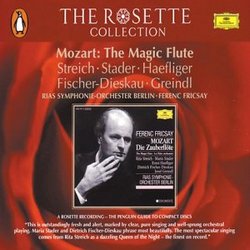| All Artists: Wolfgang Amadeus Mozart, Ferenc Fricsay, RIAS Symphonie-Orchester, Ernst Haefliger, Dietrich Fischer-Dieskau, Maria Stader, Rita Streich, Josef Greindl, Kim Borg, Lisa Otto Title: Mozart: The Magic Flute Members Wishing: 0 Total Copies: 0 Label: Deutsche Grammophon Release Date: 11/9/2004 Genre: Classical Styles: Opera & Classical Vocal, Historical Periods, Classical (c.1770-1830), Modern, 20th, & 21st Century, Symphonies Number of Discs: 2 SwapaCD Credits: 2 UPC: 028947617525 |
Search - Wolfgang Amadeus Mozart, Ferenc Fricsay, RIAS Symphonie-Orchester :: Mozart: The Magic Flute
 | Wolfgang Amadeus Mozart, Ferenc Fricsay, RIAS Symphonie-Orchester Mozart: The Magic Flute Genre: Classical |
Larger Image |
CD Details |
CD ReviewsA Top Recommendation for Mozart's Sublime Opera Johannes Climacus | Beverly, Massachusetts | 09/08/2008 (5 out of 5 stars) "Ferenc Fricsay was one of the most brilliant conductors of his generation. He died sadly young, but left behind a large recorded legacy, including this sparkling *Magic Flute*. This is an opera which can so easily be weighed down by undue seriousness, pomposity, and inflated rhetoric. Fricsay will have none of this. He keeps rhythms lively, textures airy, and stage action on the move. Even the more solemn passages--such as the Speaker's exchanges with Tamino in Act I or Sarastro's great arias in Act II--convey a luminosity and charm that one expects in a fairy tale (which of course *Zauberflöte* is). Fricsay thus resists turning *Zauberflöte* into some kind of "Masonic Oratorio," and from this approach it emerges newly minted. Of course, if you don't regard the work principally as a "light-hearted Singspiel," then there are other versions which will have greater appeal--such as those by Furtwängler or Klemperer. Otherwise, Fricsay's classic version may well serve as a top recommendation.
That status is confirmed by the accomplishments of a mostly outstanding cast: Haefleger as an earnest and mellifluous Tamino; Fischer-Dieskau as a charmer of a Papageno (nothing oafish about this bird-catcher); Rita Streich as a surprisingly euphonious, yet never less than awe-inspiring, Queen of the Night (nothing twittery about this Queen); and Maria Stader as a companionable, and dramatically believable, Pamina (few are). Josef Greindl's gruffish Sarastro and Borg's wobbly Speaker are less convincing, though neither is seriously disappointing. The choral singing is as crisp and clean as the orchestral playing (another rarity in this work). In sum, then, Fricsay's *Flute* must rank alongside Beecham's as one of the most enchanting ever recorded, not least because his lightness of touch anticipates contemporary notions of period performance practice. Given the modest cost and superbly remastered recording (adding new warmth and depth to the clarity of sound that marked previous incarnations), this can be enthusiastically recommended, even if documentation isn't as ample as one might wish. Don't miss this opportunity to hear a recording that rightly garnered a "Rosette" in recent editions of the *Penguin Guide*." |
